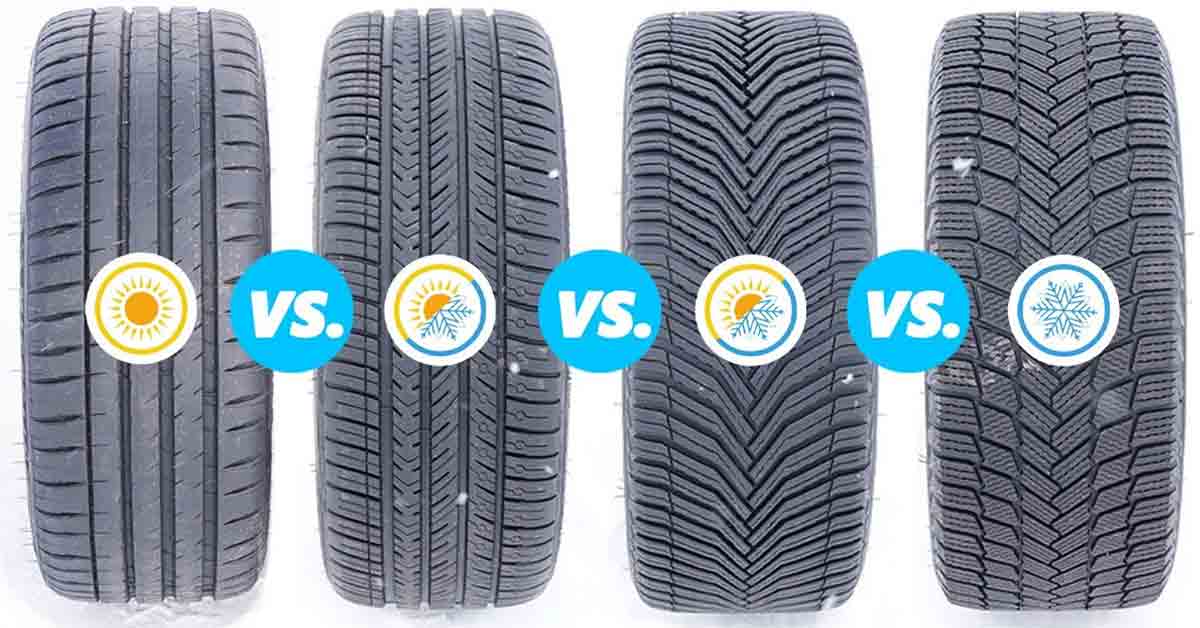🔄The Hassle and Cost of Switching Between ☀️Summer and ❄️Winter Tires
For many drivers, the traditional approach to tire management involves switching between summer and winter tires based on seasonal changes. However, this method often proves to be inconvenient and costly. Summer tires excel in warm, dry conditions, while winter tires are designed to provide traction in snowy and icy environments. Unfortunately, maintaining two sets of tires requires not only the initial investment but also regular swapping, storage, and potential wear and tear on both sets. This frequent replacement can be a hassle, especially for those with busy schedules or limited storage space. Additionally, the costs can quickly add up, encompassing not only the price of the tires themselves but also the labor associated with changing them and potential storage fees. With the complexities of tire management, many drivers are left seeking a more practical solution.
🌦️The Versatility and Affordability of All-Season Tires
All-season tires emerge as a versatile and economical alternative to traditional summer and winter tires. Engineered to perform well in a variety of weather conditions, they combine the features of both types of tires, offering a balanced solution for drivers who face fluctuating climates. The tread design of all-season tires is optimized to provide adequate grip on both wet and dry roads, ensuring that drivers can enjoy a smooth ride regardless of the weather. This universality not only simplifies tire management but also helps to stretch your automotive budget further. With all-season tires, drivers can avoid the hassle of seasonal changes while benefiting from a single set of tires that can handle most driving conditions. As a result, all-season tires present an attractive option for those seeking to reduce expenses without sacrificing safety or performance.
💰Who Benefits from All-Season Tires: Cost-Savers and Climate-Adaptive Drivers
All-season tires are particularly beneficial for specific groups of drivers. First, those who wish to save money can greatly benefit from the investment in all-season tires. By eliminating the need for two separate tire sets, drivers can allocate their savings to other areas of their automotive needs or personal finances. Additionally, all-season tires are ideal for individuals living in regions where weather conditions fluctuate frequently. For people who experience wet, dry, and light snowfall within a single year, all-season tires provide the perfect blend of performance and adaptability. They offer peace of mind for those who may not want to deal with the inconvenience of tire changes while ensuring that safety is never compromised. In essence, all-season tires cater to budget-conscious drivers and those facing variable climates, offering a practical solution for year-round driving.
🚗Recommended All-Season Tire Brands for Different People
For daily commuting and light-duty driving, consider the Michelin CrossClimate 2, Bridgestone Ecopia EP422 Plus, or Pirelli Cinturato P7 All Season Plus II, offering balanced performance with good all-around capabilities for everyday driving, reliable traction, handling, and comfort on dry, wet, and light snow-covered roads. For performance-oriented driving, the Continental ExtremeContact DWS06 Plus and Dunlop SP Sport Maxx RT2 are recommended, prioritizing responsive handling, precise cornering, and high-speed stability, well-suited for enthusiastic drivers seeking sportier performance without sacrificing year-round versatility. Drivers of trucks, SUVs, and crossovers will benefit from the Yokohama Avid Ascend GT and Michelin Defender LTX M/S, designed to provide enhanced traction, load-carrying capacity, and stability, while maintaining good wet and light snow capabilities compared to standard all-season tires.
| Category | Tire Recommendations | Key Features |
|---|---|---|
| Daily Commuting & Light-Duty Driving | Michelin CrossClimate 2 | Balanced performance, good traction, handling, and comfort |
| Bridgestone Ecopia EP422 Plus | Reliable on dry, wet, and light snow-covered roads | |
| Pirelli Cinturato P7 All Season Plus II | All-around capabilities for everyday driving | |
| Performance-Oriented Driving | Continental ExtremeContact DWS06 Plus | Responsive handling, precise cornering, high-speed stability |
| Dunlop SP Sport Maxx RT2 | Sportier performance with year-round versatility | |
| Trucks, SUVs, & Crossovers | Yokohama Avid Ascend GT | Enhanced traction, load-carrying capacity, stability |
| Michelin Defender LTX M/S | Good wet and light snow capabilities |
🏷️Purchase Timing: Buy Off-Season for Better Deals
Timing your purchase of all-season tires can significantly impact your overall cost. Generally, the peak seasons for tire changes—spring and fall—can lead to inflated prices and longer wait times at tire shops due to high demand. To maximize savings, consider purchasing all-season tires during the off-season, typically in late winter or late summer. Many retailers offer promotions and discounts during these quieter months, allowing savvy shoppers to snag high-quality tires at lower prices. Additionally, by planning ahead and avoiding the rush, you can ensure that you have your new tires installed before the weather changes. Taking advantage of off-season sales not only saves you money but also guarantees that you have the right tires ready for whatever conditions lie ahead. By being strategic about your purchase timing, you can enjoy the benefits of all-season tires while keeping your budget intact.

